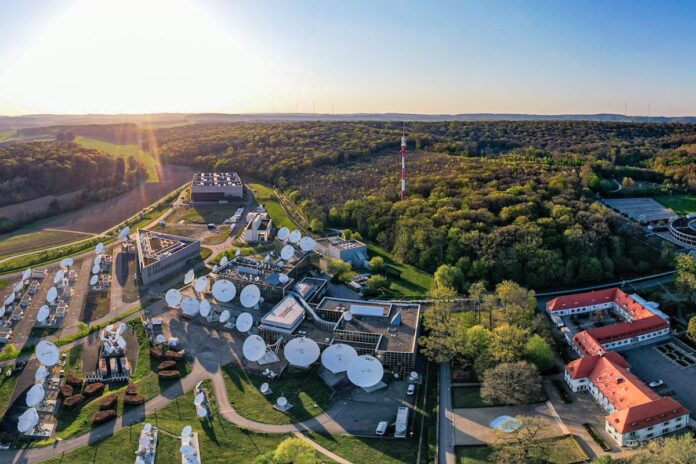The deal is expected to close this week – meanwhile, the UK will stump up another €163 million in the proposed latest round of funding for Eutelsat Group to maintain its stake
The US telecoms regulator, the Federal Communications Commission (FCC) has approved Intelsat’s plan to transfer control of the licences granted by the FCC to SES. SES has its HQ at Betzdorf, Luxembourg (pictured above, photo courtesy of SES) and announced a deal to acquire Intelsat for $3.1 billion (€2.66 billion) in April 2024.
It has now completed all the regulatory approvals required, having received unconditional approval from the European Commission in June. SES confirmed it plans to close the transaction formally later this week.
The FCC said its “approval of the SES Intelsat transaction builds on the commission’s efforts to promote the provision of robust and competitive satellite services to the public. It has the potential to lower costs, improve quality and increase investment. It also will create a more vigorous multi-orbit competitor in the satellite communications marketplace.”
Eutelsat Group gets a boost too
Euronext Paris/London Stock Exchange (ETL) has announced that the UK’s Department for Science, Innovation and Technology (DSIT) will participate in the contemplated capital increase announced by Eutelsat on 19 June. It will contribute €163 million, increasing the total amount to be raised in this funding round to €1.5 billion.
Other Reserved Capital Increase Investors that have committed to this round, led by the French State via the Agence des Participations de l’Etat (APE – €551 million), are Bharti Space Limited (€30 million), CMA CGM (€100 million), and FSP (€57 million). The subsequent Rights Issue would amount to €672 million.
The UK’s role in European satellite
This investment means that the UK will retain its 10.89% shareholding in Eutelsat Group and it will support the company’s low-Earth orbit (LEO) services into the future. The stake is the result of its original holding in OneWeb: in July 2020, the UK government and Bharti Space rescued OneWeb from bankruptcy, with each buying a 45% share for about $500 million. The UK held the ‘golden share’ – giving it a controlling say about the company’s activities and a veto over any further sale or merger.
Eutelsat and OneWeb combined in September 2023, to become the Eutelsat Group, which described itself as “the first GEO-LEO integrated satellite group, transforming space communications and addressing the fast-growing connectivity market”. The UK retains the rights negotiated in 2023 as part of the merger between OneWeb and Eutelsat to form Eutelsat Group.
Eutelsat made commitments to provide benefits to the UK such as opportunities for university students, a guaranteed number of jobs and priority access to services for the UK government in certain contracts.
Jean-François Fallacher, CEO of Eutelsat, stated, “In the current environment it is crucial that our countries continue to collaborate and support each other, including in Space, which has become a key sovereign strategic asset. We remain committed to the UK which we consider as one of our home markets and to supporting the development of OneWeb to address the needs of all our sovereign and commercial stakeholders.”
What happens next?
The commitments of the Reserved Capital Increase investors are subject to shareholders’ approvals at an Extraordinary Shareholders’ Meeting to be held around the end of the third quarter of calendar 2025 and the customary regulatory approvals – among other things. The Reserved Capital Increase and the Rights Issue are expected to be completed by the end of calendar 2025.
Assuming all proceeds as expected, the French State would hold a stake of 29.65% of the capital and voting rights, while Bharti Space Limited, His Majesty’s Government, CMA CGM and FSP would respectively hold 17.88%, 10.89%, 7.46%, and 4.99% of the share capital and voting rights. It has been specified in the agreement that the Reserved Capital Increase Investors would not be in a position to launch a public takeover.
Sovereign strategic asset
Peter Kyle, Secretary of State for Science, Innovation and Technology, added, “From checking the weather forecast on our phones to navigating with GPS in our cars, satellites underpin industrial activity worth £364 billion to the UK economy. But their critical role extends far beyond economic growth.
“As our adversaries increasingly use space technologies to harm us, resilient satellite connectivity has become essential to our continent’s national security. This investment reflects our commitment to support the development of these critical technologies and maintain an important stake in the global satellite communications sector.”




